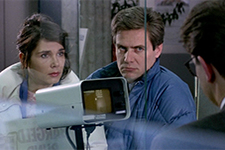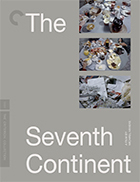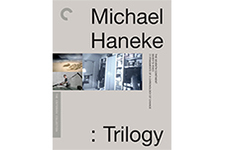The Seventh Continent (Der siebente Kontinent)
|  Although it was technically his theatrical debut, The Seventh Continent (Der siebente Kontinent) was actually Michael Haneke’s eighth feature film. For the previous 15 years he had worked in the Austrian television industry, writing and directing seven made-for-television movies, where he honed his skills as a filmmaker and writer. However, outside of Austria, he was a virtual unknown, so when The Seventh Continent debuted at the Cannes Film Festival in the spring of 1989, it felt like the revelation of a new and scorching talent—even though Haneke was already 47 years old. It is no small irony that he had originally pitched it as a television movie and been rejected, surely because of its dark and seemingly nihilistic worldview. The Seventh Continent centers on the Schober family: father Georg (Dieter Berner), who is an engineer; mother Anna (Birgit Doll), who runs an optometrist office with her brother, and their adolescent daughter, Eva (Leni Tanzer). The film is divided into three parts, the first two of which focus on the general mundanity of the Schobers’ unremarkable middle-class existence, with Haneke’s camera often focusing on daily rituals at the expense of character. We see close-ups and medium close-ups of shoes being tied, toothpaste being put on toothbrushes, cereal being eaten, their car going through the car wash, and so forth. What we learn about the family we must glean from brief bits of conversations, with the majority coming from a pair of letters, one written by Anna and one by Georg, written to Georg’s mother, which we hear in voice-over. Haneke is clearly keeping us distanced from the Schobers, allowing us to see their day-to-day lives without really penetrating the surface. And that is partly what makes the third act of the film even more disturbing than it already is. (Those who have not seen the film might want to abandon this review here, as it reveals crucial plot information that Haneke strategically keeps hidden until this point.) Throughout the film there have been intimations that things aren’t right. No one in the family seems particularly happy or satisfied. Eva lies to her schoolteacher and pretends to be temporarily blind for no discernible reason. Anna’s letter to her mother-in-law sounds almost desperate in trying to convey how conventionally successful her son is. Georg has some minor conflict at work with his boss, who is not particularly fair to him and later has to take a leave of absence. It is nothing major, but rather an accumulation of small disappointments, resentments, failures, ennui. So, when Georg and Anna begin doing some strange things, such as withdrawing all their money from the bank and claiming they are planning to immigrate to Australia (the “seventh continent” of the title) and buying hardware such as sledgehammers and bolt cutters, the tension starts to mount. Haneke keeps the purpose of their activities vague for as long as possible, then starts us on a deep dive into the Schobers’ existential abyss, which begins with a torturously prolonged depiction of their systematically destroying virtually everything in their house. As he did with the early sequences involving their mundane day-to-day activities, Haneke depicts this orgy of destruction with close-ups and medium close-ups that deny us any view of the characters doing the destroying. We never see George’s face as he smashes furniture with a sledgehammer, or Anna’s face as she pulls each of their record albums off the shelf and bends it until it snaps in half, or Eva’s face as she takes a large pair of shears to all her artwork, including one we watched her draw earlier in the film. As he has done throughout the film, Haneke holds the camera for almost unbearably long periods of time on the repetitious destruction, particularly the shot where they tear up all their money and flush it handful-by-handful down the toilet (a scene that Haneke rightly predicted would really upset audiences, thus lending credence to his film’s stance on the modern obsession with materiality). The destruction of all their belongings leads inexorably to their own physical destruction, as they each overdose in turn on a medication we saw Anna filling earlier in the film. Eva first, then Anna, then Georg, with the film concluding on a shot of them lying motionless in bed together as the camera slowly moves in on the only thing still working in the house—a television set that has gone to static—which gives way to a final title card that clinically informs us of when the bodies were found and how Georg’s parents refused to believe it was a group suicide and insisted on a murder investigation. The central dramatic and psychological strength of The Seventh Continent and its primary weakness is Haneke’s ruthlessly decision to keep the Schobers at arm’s length. They remain figures, representatives of a staid middle class that has lost touch with meaning in life and see no way out except to destroy everything they’ve accumulated and then themselves. Obliteration is the only option, which, absent psychological or sociological insight, is hard to read as anything other than nihilism. The effect is confounding in its emotional devastation and almost sadistic insistence on presenting such a horrific event while offering no real insight (the plot was apparently inspired by an actual case Haneke read about in the newspaper). The point seems to be that there really is no point; after all, what explanation could possibly suffice for such a profound rejection of modern life? The theme of humanity’s dislocation from itself in the modern world is a constant in Haneke’s films, and The Seventh Continent establishes it with cool, brute force. The recurring image of an impossible, gauzy shoreline supposedly in Australia but really nowhere, comes to stand for the impossibility of connection and meaning in a world dominated by materiality, indifference, and transactionalism. It is not a pretty picture that Haneke paints, but it is one that he clearly sees and conveys with no mercy.
Copyright © 2023 James Kendrick Thoughts? E-mail James Kendrick All images copyright © The Criterion Collection | |||||||||||||||||||||||||||||
Overall Rating: 

 (3)
(3)


 The Seventh Continent is available as part of Criterion’s three-disc set “Michael Haneke : Trilogy,” which also includes Benny’s Video and 71 Fragments of a Chronicle of Chance.
The Seventh Continent is available as part of Criterion’s three-disc set “Michael Haneke : Trilogy,” which also includes Benny’s Video and 71 Fragments of a Chronicle of Chance.